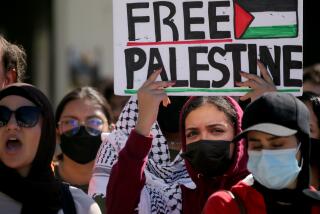Keeping Catholic Colleges in Line : U.S. Educators, Pope to Confer on Adherence to Doctrine
- Share via
NEW YORK — For more than three years, the Vatican has been seeking to set firmer rules to keep Roman Catholic colleges and universities toeing the church line--sometimes to their chagrin.
That issue will come to a head next week when a delegation of 230 of their leaders worldwide confers with Vatican officials and Pope John Paul II about the matter. Eighteen delegates are from U.S. Catholic universities, including Sister Sally Furay, vice president and provost at the University of San Diego.
“We’re hoping to work through some of the ambiguities that need to be resolved,” said Father Joseph A. O’Hare, president of New York’s Fordham University.
232 Catholic Colleges
Fordham is one of 232 Catholic institutions of higher learning in the United States, many established by religious orders, but now mostly governed by independent boards of trustees.
They insist that they uphold their Catholic identities in a broad sense but that specifying ecclesiastical restraints would cloud academic standing and integrity.
“Church officials have every right to criticize academic teaching, but to try to apply sanctions in a university is not appropriate,” O’Hare said in an interview. “It wouldn’t work.”
The Vatican’s Congregation for Catholic Education in 1985 first circulated its “working paper” of suggestions for bishops to require adherence of Catholic colleges and universities to church criteria.
The paper stirred wide protest. Catholic educators said such control would undermine standards of academic freedom, jeopardize accreditation, block government aid and destroy many colleges.
Both their faculties and student bodies are widely interreligious, but they maintain that they carry on Catholic ideals in an ecumenical atmosphere of open inquiry.
Responding to the protests, the Vatican last November issued a revised working paper, which will be under consideration at the meeting between university leaders and Vatican officials next Tuesday through Saturday.
“It’s a much better document, with a lot of positive things about it,” said Brother Raymond L. Fitz, president of the University of Dayton, the nation’s ninth-largest Catholic university.
However, he added, “the whole thing still needs work to define more clearly the autonomy of a Catholic university and its academic freedom.”
“We’re going to have to make the point that we’ve been able to maintain strong institutional Catholic identity,” Fitz said, “and at the same time do so in an atmosphere of academic and institutional autonomy.”
The new draft provides that no university may have the word Catholic in its official title without consent of ecclesiastical authority, which is to ensure Catholic doctrinal teaching and observance at the university and permit intervention for grave reasons to declare it “no longer Catholic.”
“In ways consistent with the different academic disciplines, teachers will be faithful to Catholic doctrine in their research and teaching,” the document says.
At the same time, the document often qualifies its requirements by saying they should be worked out on a consultative basis and may vary according to university regulations and accepted academic practices.
The provisions enable “universities to dialogue with American bishops about the goals,” said Sister Alice Gallin, secretary of the Assn. of Catholic Colleges and Universities, based in Washington. “It’s a more decentralized way of implementation.”
She said the first part of the document in setting the general goals of Catholic universities is “something we can live with without too much trouble,” but the second part is “potentially more troubling.”
It lays down so-called “norms” for Catholic institutions, a word she said can be interpreted as “laws.” She said the educators also do not like the document saying bishops could “intervene” in universities.
“The problem is sometimes a question of the words used,” she said. “We all agree that the purpose of a good strong Catholic university is to remain Catholic in purpose.
“But we’ve done very well over the last 200 years and ought to be allowed to continue.”
More to Read
Sign up for Essential California
The most important California stories and recommendations in your inbox every morning.
You may occasionally receive promotional content from the Los Angeles Times.













